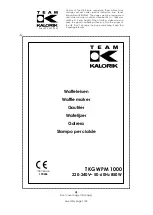
II-1
CHAPTER II
MECHANISM
2.1
THEORY OF OPERATION
2.1.1
Print Mechanism
(1)
Structure of Thermal Head
This machine uses thermal transfer printing. The thermal print head has a heat generator
consisting of 64 heating elements which are vertically aligned as shown in Fig. 2.1-1.
Each heating element is 0.195 mm wide by 0.141 mm high.
Fig. 2.1-1 Heat Generator of Thermal Head
(2)
Printing process
When the cylindrical rubber platen roller is pressed against the thermal print head with the
tape* and ink ribbon sandwiched inbetween, the CPU applies electric power to the selected
ones of those 64 heating elements.
* Laminated tape when using laminated tape cassettes.
Non-laminated tape when using non-laminated cassettes.
[For tape cassette except non-laminated thermal film tape cassettes]
If the selected heating element(s) generates heat, the ink on the sandwiched ribbon will be
melted and transferred to the tape, producing a dot(s) on the tape. The ink ribbon and the
tape are advanced and then the next heating cycle is repeated, thus forming a character on
the tape.
[For non-laminated thermal film tape cassettes]
If the selected heating element(s) generates heat, the thermal film tape develops itself to
produce a dot on the tape. The tape is advanced and the next heating cycle is repeated,
thus froming a character on the tape.
(3)
Character Formation
While the drive motor (DC motor) feeds the tape and ink ribbon by 0.141 mm for approx
14.0 ms, the thermal head generates heat once. The feed amount of 0.141 mm is smaller
than the
width (0.195 mm) of the heating elements so that the heat generated at one
heating cycle will overlap with the next heating cycle. This forms a character having no gap
between adjacent printed dots.
Summary of Contents for P-touch PT-1100
Page 2: ...SERVICE MANUAL MODEL PT 1100 1130 1170 1180 11Q PT 1250 1160 ST 1150 Heavy Duty LabelerTM ...
Page 5: ...CHAPTER I SPECIFICATIONS ...
Page 9: ...I 3 Fig 1 1 2 Key Arrangement 1 ...
Page 10: ...I 4 Fig 1 1 2 Key Arrangement 2 ...
Page 11: ...I 5 Fig 1 1 2 Key Arrangement 3 ...
Page 13: ...CHAPTER II MECHANISMS ...
Page 50: ...35 II 2 3 4 Troubleshooting Flows 1 Tape feeding failure ...
Page 51: ...36 II ...
Page 52: ...37 II 2 Printing failure ...
Page 53: ...38 II ...
Page 54: ...39 II 3 Powering failure Nothing appears on the LCD ...
Page 55: ...40 II 4 No key entry possible ...
Page 56: ...CHAPTER III ELECTRONICS ...
Page 75: ...III 17 3 3 3 Troubleshooting Flows 1 Tape feeding failure 2 Printing failure ...
Page 76: ...III 18 3 Powering failure Nothing appears on the LCD ...
Page 77: ...III 19 4 Abnormal LCD indication ...
Page 78: ...III 20 5 No key entry possible 6 Tape cassette type not identified ...
Page 80: ......
Page 81: ......
Page 82: ......
















































